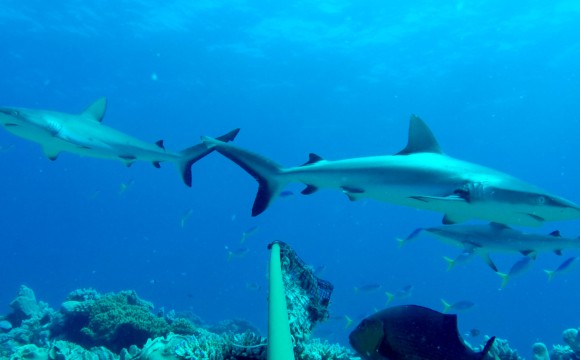
A global research project, facilitated by an Australian Research Data Commons’ supported platform, has revealed that most of the world’s reef sharks are in rapid decline. It also uncovered positive findings in a few areas, including Australia, as a result of good fisheries and conservation management.
The ground-breaking research, the world’s first global study of its kind, was recently published in Nature.
The study, which was part of a Global FinPrint project, found sharks were absent on almost 20 per cent of 371 reefs in 58 countries.
Prior to this study, the widespread decline in global reef shark populations was largely undocumented according to Dr Tim Langlois, from University of Western Australia’s (UWA) School of Biological Sciences and Oceans Institute.
The study was undertaken by researchers at the UWA and the Australian Institute of Marine Science, who relied on the Australian Research Data Commons’ supported GlobalArchive platform for their work. The platform, which is hosted on the ARDC’s Nectar Research Cloud, is an online repository of fish and shark imagery data. The researchers used GlobalArchive to upload data from international video surveys into the project’s global database.
“GlobalArchive was instrumental in ensuring the large amount of data we have in Australia was accessible to all research partners,” Dr Langlois said.
“Without the investment from UWA and the ARDC we would not have been able to gauge how shark conservation in Australia is performing globally.”

Although the overall findings from the study are extremely worrying, conservation and management efforts have helped stem the decline in Australia. Dr Langlois said that the shark populations on Australia’s coral reefs are still largely intact.
“Australia is one of several nations, including the Bahamas, the Federated States of Micronesia, French Polynesia, the Maldives and the United States, where shark conservation on coral reefs is effective,” he said.
Dr Langlois noted that these countries generally have well-governed fisheries and conservation policies and either ban all shark fishing or have strong, science-based limits on the number of sharks that are allowed to be caught.
Another researcher involved in the project, Dr Mark Meekan, from the Australian Institute of Marine Science, has noted the important role that sharks play ecologically and economically.
“Sharks are important for the ecology of coral reefs, particularly at a time when they are facing so many other threats from climate change.”
Reef sharks also play an important role in the economies of small island nations, as there are a key part of reef tourism.“Rebuilding shark numbers isn’t just good sense ecologically — it also makes good sense economically,” Dr Meekan said.
The study involved the cooperation and collaboration of researchers, scientists and conservationists around the world, who captured more than 15,000 hours of videos over four years. The survey data were generated from an underwater video camera attached to a bait bag, containing a small amount of fish.
The data gathered from the survey will be used as a baseline to improve management of coastal reef systems around the world.
Categories
Research Topic
Related Case Studies






